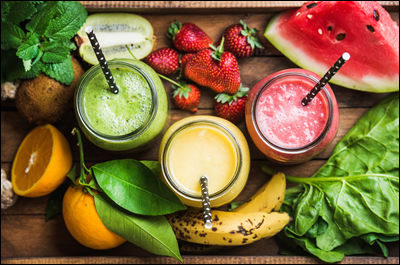Four Ways To Declutter Your Diet

The phrase "clean eating" is pretty popular these days, but the concept isn't really new. In general, clean eating means eating foods that are fairly close to their natural state – that is, minimally processed – and getting rid of the excess 'clutter' in the form of a lot of added fats, sugars, salt and unnecessary additives. Cooking foods at home and sourcing fresh, local ingredients is often part of the mix, too. Overall, clean eating is meant to call more awareness to what we’re putting in our bodies.
It’s a great concept, but let’s not get carried away. First of all, no one would argue that whole, unprocessed foods without packaging or labels are anything but good choices. But creating a daily diet made up of only those foods might be intimidating to those who simply need to get a meal on the table at the end of a busy day. Besides, there are plenty of healthy, wholesome – and yes, even 'clean' – foods that come in packages; frozen loose pack veggies and fruits, canned tuna, salmon or beans, brown rice or whole grain pasta, just to name a few.
So if you’re already eating plenty of fruits and veggies (even if they've been frozen), whole grains (yep, even those that come packaged in a plastic bag) and lean proteins (even those that come from a can), your diet might be pretty clean already. And even if you’re not eating this way, maybe you don’t need to do a "clean sweep" – perhaps a little "decluttering" is all it takes.
How to Declutter Your Diet
Read food labels to help you ditch extra sugar, salt and fat.
You've heard it before, but it’s generally true – shorter ingredients lists usually mean fewer unwanted additives and more wholesome products. Check labels for added fats, salt and sugar, and do your best to choose items that have minimal amounts added. For example, choose plain yogurt rather than pre-sweetened, choose plain frozen vegetables rather than those with sauces added, look for whole grain breads or cereals with little to no added sugar.
Lose the refined carbs and up your fruit and veggie intake.
This sounds so simple, but it’s one of the best things you can do to improve the overall quality of your diet. When you make a point to include a fruit or vegetable at every meal, it "squeezes out" many of the unwanted foods and ingredients you might otherwise eat. Swap sugary, fatty ice cream for a delicious bowl of berries, have a side salad with your sandwich instead of fries, or try snacking on baby carrots and humous instead of chips.
Get rid of the calorie clutter in your beverages.
When it comes to added calories, beverages are – for many people – their undoing. Between sugary soft drinks, fruit juices (yes, even 100%, fresh-pressed, all-organic), alcoholic beverages and fancy coffee drinks, it’s not hard to take in hundreds of calories a day from beverages alone. Plain tea is a great alternative because it can be drunk hot or cold, it has no calories, and has naturally-occurring compounds that may offer some health benefits, too.
Clear the clutter from your fridge, freezer and pantry.
A little kitchen spring cleaning can really help you declutter your diet. Fill your pantry with high-fibre whole grains (like 100% whole wheat pasta, bread, cereals and flour, as well as foods like quinoa, millet and brown rice) instead of the refined stuff. Stock up on beans and canned tomatoes instead of prepared spaghetti sauces or soups that are high in salt. Stock your refrigerator and freezer with plain fruits and veggies, rather than those with sugary syrups or salty, fatty sauces. And keep some canned tuna or salmon on hand in the pantry, or frozen fish filets or chicken breasts in the freezer for quick, healthy meals, rather than frozen chicken nuggets or breaded fish sticks.
Based on an article by Susan Bowerman, M.S., RD, CSSD, CSOWM, FAND – Senior Director, Worldwide Nutrition Education and Training

